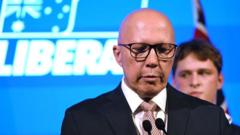In a stunning electoral outcome, Australia's Liberal Party has been left devastated following its latest federal election defeat, marking potentially the party's worst performance in history. The defeat was underscored by the loss of its leader, Peter Dutton, who lost his long-held seat of Dickson after 24 years. With the Labor Party's sweeping victory, the Liberals find themselves in disarray, urgently needing to assess the failures that led to this outcome.
Australia's Liberal Party Faces Historic Defeat and Leadership Crisis

Australia's Liberal Party Faces Historic Defeat and Leadership Crisis
The Australian opposition party grapples with its unprecedented electoral loss as calls for a leadership overhaul emerge.
Dutton's resignation from Parliament as both leader and member signals a critical juncture for the Liberal Party. Dutton's defeat by Labor's Ali France in his Queensland backyard has prompted calls from within for a thorough review of leadership and strategy. "We have to listen to Australians,” said Liberal MP Keith Wolahan, who is also facing uncertainty over his own future. The party suffered particularly severe losses in major urban centers such as Sydney, Melbourne, Brisbane, and Adelaide.
Critics attribute Dutton's struggles to his leadership style and the broader "Trump effect," citing hesitance among voters towards him. Former adviser Andrew Carswell bluntly described the defeat as a "complete catastrophe for the Coalition," suggesting it reflects a clear rejection by Australian voters.
In the face of this crisis, discussions around potential successors have begun, with names like shadow treasurer Angus Taylor and deputy leader Sussan Ley emerging as candidates for the top job. However, without a definitive leader to guide them, the Liberal Party faces a challenging road ahead to recover lost support and reshape its identity to resonate with voters.
As the country looks towards the next election in 2025, the Liberal Party's ability to adapt and reconnect with the electorate will be crucial in determining its future in Australian politics.
Critics attribute Dutton's struggles to his leadership style and the broader "Trump effect," citing hesitance among voters towards him. Former adviser Andrew Carswell bluntly described the defeat as a "complete catastrophe for the Coalition," suggesting it reflects a clear rejection by Australian voters.
In the face of this crisis, discussions around potential successors have begun, with names like shadow treasurer Angus Taylor and deputy leader Sussan Ley emerging as candidates for the top job. However, without a definitive leader to guide them, the Liberal Party faces a challenging road ahead to recover lost support and reshape its identity to resonate with voters.
As the country looks towards the next election in 2025, the Liberal Party's ability to adapt and reconnect with the electorate will be crucial in determining its future in Australian politics.



















